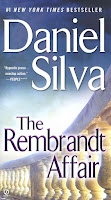Reading P G Wodehouse - for me - is like having the best kind of afternoon tea.
China teapots and tiny fancy fluffy cakes on a tiered cake stand. All style, no substance, and pure escapism.
At the start of this one, Bertie Wooster has grown a moustache, much to the chagrin of his gentleman's personal gentleman, Jeeves.
However, the moustache soon takes a back seat as Bertie's Aunt Dahlia (not to be confused with Aunt Agatha) puts out an SOS, and Bertie and Jeeves decamp to the countryside for shenanigans.
Throw in an ex-fiancee of Bertie's who thinks he's still in love with her, a pearl necklace that may or may not be real and the gastronomical delights of Aunt Dahlia's personal chef, and Jeeves and the Feudal Spirit is a classic entry in the Jeeves and Wooster series of novels.
If your brain needs a holiday, this is absolutely perfect. You can send your brain to go fishing, or something.
Lucy Muchelney is battling heartbreak, and an uncertain future. The woman she loves has just married a man, and Lucy's brother is talking about selling their father's telescope now that he's passed on.
Lucy is an amateur astronomer, who spent years assisting her father and doing mathematical calculations herself as his health failed. The last thing she wants for herself is to be stifled in a loveless marriage, so she decides to take matters into her own hands.
She travels from her home in Lyme to London, where she meets Catherine - Lady Moth. Catherine is the widow of an explorer, and a great supporter of science and scientists. She backs Lucy to translate the work of a great French astronomer into English, and also takes Lucy under her wing.
It's not long before the bond between the two women develops into something deeper, even as they battle against 19th century mores and sexism.
Helping Lucy forge her path makes Catherine realise that maybe there's more to life for her than just being a supporting player.
I enjoyed this very much of a lot, but one of the things I enjoyed most was the centring of Catherine's embroidery. Traditionally in books, embroidery is used as a short-cut for female characters who are Not Like Other Girls. And when that DOESN'T happen - when it's treated as a genuine interest/hobby/skill/talent - it's truly great to see.
.jpeg)










